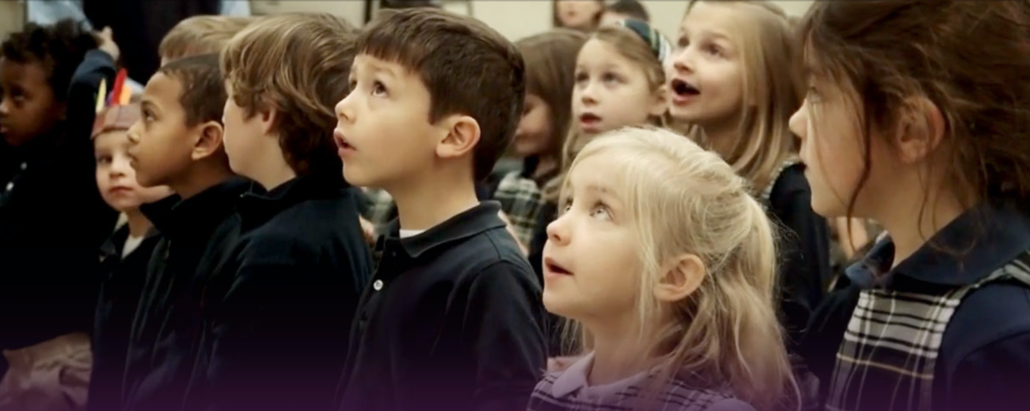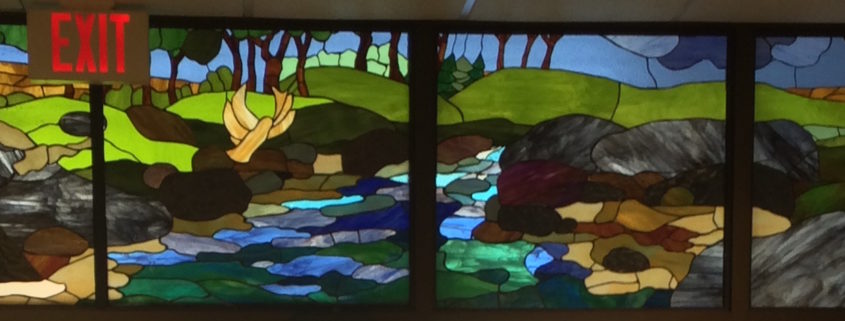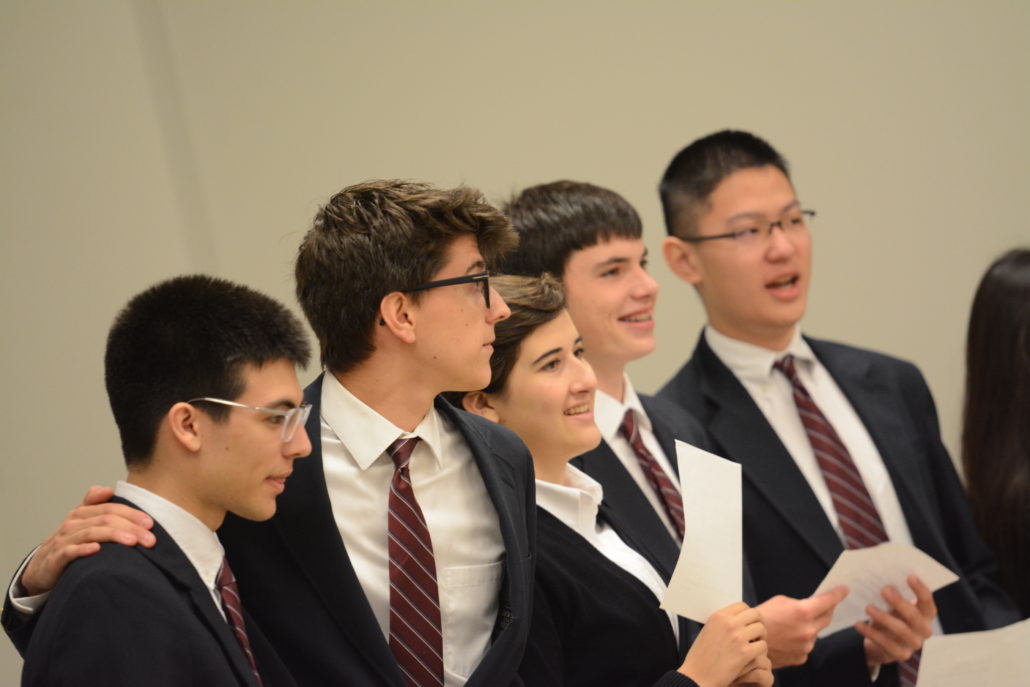Well Suited for Joy
Students pass beneath a beautiful stained-glass window each morning as they walk into school. The glass was crafted by fellow classmates, teachers, parents, grandparents, and friends over the course of two years before being installed in September 2016. It is a reminder that students are entering into a different kind of place – a school where beauty surrounds us, where the sound of singing is oft heard, and where a love for learning is cultivated. Classical Christian education is meant to be a joyful education, filled with discovery, delight, and friendship.
Susan Wise Bauer once said,
Because it uses real, living books and hands-on experimentation rather than relying on textbooks and canned presentations, classical education is a matter of exploration, of reading, thinking, and talking and of discovery – not of rote memorization and regurgitation.
For those with questions like, “isn’t classical education too structured?” or “doesn’t all the memorization take away the joy of learning?” all I can say is, come, taste and see the fruit. Here are four ways that classical education at Covenant is suited to bring joy to your child’s life.
Delight in Discovery
Though much of modern education and life serves to deaden this instinct, children are filled with a natural curiosity and wonder of the world. At Covenant, we want to respect the image of God in our students in this way.
A. G. Sertillanges recognized this fact by saying,
Every intellectual work begins by a moment of ecstasy; . . . Now what is this ecstasy but a flight upwards, away from self, a forgetting to live our own poor life, in order that the object of our delight may live in our thought and in our heart.
We want our students to marvel at the fall colors. To wonder at the metamorphosis of the caterpillar into a butterfly, to stand awestruck at the moon eclipsing the sun, to dream of where the geese fly in the fall, to ponder triads in music and in nature. This delight in discovery is at the heart of a classical education at Covenant.

Overcoming Obstacles Together
Not much worthwhile in life comes easy. Teddy Roosevelt stated the idea like this:
Nothing in the world is worth having or worth doing unless it means effort, pain, difficulty. . . I have never in my life envied a human being who led an easy life. I have envied a great many people who led difficult lives and led them well.
Yes, of course, classical education is hard at certain points. We are seeking to turn boys and girls into courageous and wise men and women. It’s a challenging road, and that’s why it’s so important that our students learn in a community where this effort is honored by their teachers and peers. These habits and skills must be learned by each individual, but not alone. Our students learn and grow with other students facing similar challenges, and taught by teachers who love Jesus and who want what is best for them. This friendship makes all the difference.
A Living Curriculum
One of the best things that we give to our students at Covenant is our teachers. Teachers who love Jesus, who love their students, and who love what they teach. Listen to how John Milton Gregory described the excellent teacher a century ago:
He must ever be a cold and lifeless teacher who only half knows the lessons he would teach; but he whose soul has caught fire from the truths which he carries, glows with a contagious enthusiasm and unconsciously inspires his teachers with his own deep interest.
We are blessed to have teachers who embody a love for learning and teaching. Having consistently seen their Christ-like character, I am thankful that my children are being shaped and formed by Covenant’s teachers. Gregory describes what happens when a school is filled with teachers like this:
There will come to our schools an attractive charm which would at once increase their numbers and double their usefulness. The school-rooms, now so often dark and dull, would glow as with a living light, and teachers and pupils, instead of dragging to their weary task, would hasten to their meeting as to a joyous feast.
Inheritors of Freedom
The ultimate goal of our education at Covenant is the formation of our students into young men and women who love God with all their heart, soul, mind, and strength. But who is able to do this? To love God rightly, to have affections ordered toward their proper end, to seek what is good and beautiful, and to turn away from what distracts and diminishes glory – this takes training in the Spirit.
A classical education is designed to answer the question Anthony Esolen asks in Life Under Compulsion:
How to raise children who can sit with a good book and read? Who are moved by beauty? Who delight in innocence? Who can walk outdoors and enjoy the beauty of weeds and sparrows? Who still possess youth, which lends them both a frolic childlikeness and a wisdom beyond their years? Who have no compulsions – who don’t have to attend to the constant buzzing of a smartphone, or click on the next link and the next link and the next link, or buy the latest gadget, or submit to the instant urge?
He answers the question this way:
To resist Life Under Compulsion, to raise children who can throw off the shackles and enjoy truly free, and full, lives, we must affirm the old meaning of the English word free, which is related to joy and greatness of heart . . .
But what is it to be free? How do we cultivate this outward-looking freedom that sets our hearts toward what is good and beautiful? The answer is what a wise pastor once called the “expulsive power of a new affection.” We will not, and our students will not, undertake the hard work of saying no to lesser things – at least not for long – until we are gripped by the beauty and goodness of something greater. “To free oneself from the accumulated sludge of sin,” Esolen writes, “is to free oneself for the freedom of heart that is love.”
Parents choose the challenge of classical education because they want their children to learn to know this freedom. There is an easier road, for sure:
. . . you may wish to raise up Contented Cows, placidly chewing their cuds in a field of creature comforts, or Harried Hamsters, racing on the Mill of the World. . . . The chains are right here, if you like.
Yet so is the window.
Although it is not as easy or “fun” as other roads, there is much joy on the journey to be had. And what is more – there is a harvest, for those who faint not. (Gal 6:9).





